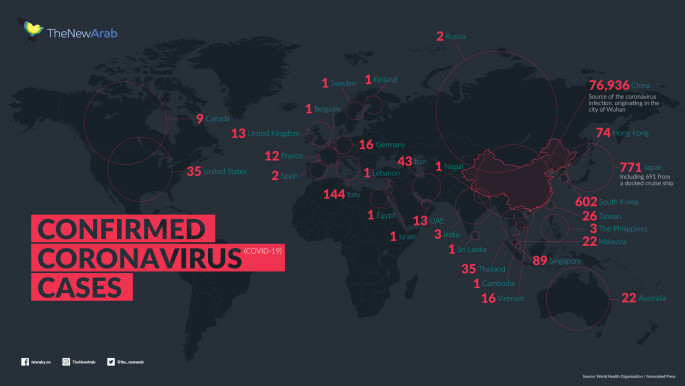Hundreds of Israelis ordered to self-quarantine as Israel blocks South Korean flight amid coronavirus fears
Israel has published a list of the sites visited by a group of South Korean tourists who later tested positive for the virus, amid fears of a major outbreak.
3 min read
18 South Korean tourists tested positive for coronavirus on their arrival from Israel [Getty]
A plane which arrived in Tel Aviv's Ben Gurion Airport from Seoul was held on tarmac on Saturday, while 200 Israelis thought to have come in contact with a South Korean tourist group were ordered to self-quarantine, amid fears of a major outbreak in the Jewish state.
According to AFP, a Korean Air flight carrying 200 passengers was made to turn back, but only after 12 Israeli passengers on board were allowed to disembark and taken away in ambulances to be quarantined.
In response, the South Korean foreign ministry summoned Israel's charge d'affaires to protest the "excessive, unreasonable measure" on Sunday against its nationals, the country's Yonhap news agency reported.
According to Albawaba, Seoul was faced with an abrupt refusal when the Israeli government was asked to reconsider its intentions to block the arrivals from entering.
More than six people have died and more than 600 infected in South Korea, where the country has raised its coronavirus alert to the "highest level".
As part of measures to combat the new coronavirus, Israeli authorities on Sunday banned all flights from both South Korea and Japan, according to Israeli and international media sources.
Read more: Fourth Israeli diagnosed with coronavirus on stranded cruise ship, as global infection spreads
Approximately 200 Israeli students were ordered to begin a two-week quarantine from Sunday after having come into contact with tourists who had contracted the virus, the health ministry said.
Twitter Post
|
Some 18 of them were discovered to be infected once they had returned to their home country, prompting Israel's health ministry to order 180 pupils and 19 staff from three seperate schools who visited the sites at the same time as the South Korean visitors to self-quarantine.
Twitter Post
|
The health ministry also published a comprehensive list of the sites visited by the tourists, ordering "anyone who has been in touch with the pilgrims" to "home-quarantine until 14 days from the encounter with the group have passed", according to AFP.
The Palestinian health ministry also urged those who had come in contact with the to tourists to remain in quarantine, adding that they had visited tourist sites in Jerusalem, Nablus, Bethlehem, Jericho and Hebron.PA Prime Minister Mohammad Shtayyeh ordered the sites closed until further notice, and all employees to be screened.
In a briefing on Saturday evening, Moshe Bar Siman Tov, director-general of the Israeli health ministry, announced that Israelis returning from South Korea and Japan would need to self-quarantine for two weeks, adding to guidelines in effect for those returning from China, Thailand, Singapore, Hong Kong and Macau.
The ministry's latest measures have caused an uproar in the Knesset foreign ministry, with concerns growing over the potential impact on diplomatic relations, tourism and business.
On Thursday, four Israelis who were onboard a cruise quarantined for two weeks in a Japanese port, were diagnosed with the virus.
Agencies contributed to this report.
Follow us on Twitter and Instagram to stay connected

![Israel coronavirus [Getty] Israel coronavirus [Getty]](/sites/default/files/styles/image_345x195/public/media/images/F777622F-CACE-41B7-B864-0E9BED8648EA.jpg?h=d1cb525d&itok=_X23enNs)




 Follow the Middle East's top stories in English at The New Arab on Google News
Follow the Middle East's top stories in English at The New Arab on Google News
![Israeli forces ordered bombed Gaza's Jabalia, ordering residents to leave [Getty]](/sites/default/files/styles/image_330x185/public/2176418030.jpeg?h=a5f2f23a&itok=_YGZaP1z)

